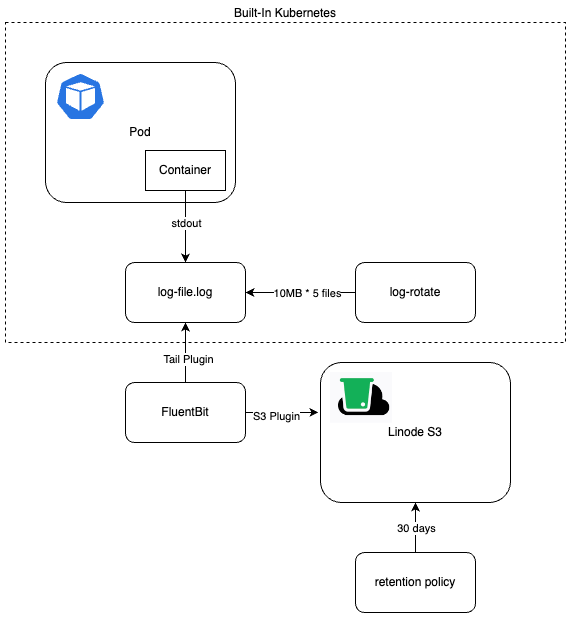- Published on
Exporting Kubernetes Logs to Linode S3 using FluentBit
- Authors

If you have a requirement to export logs for archive but don't require centralised querying or indexing that a more sophisticated solution such as Grafana Loki provides, it's possible to export logs to multiple destinations using FluentBit.
Overview
The architecture is shown below. Kubernetes by default rotates logs based on file size. Our aim is to export these logs to S3 for archive. We want to set a retention policy on the bucket of 30 days.

Kubernetes Logging
Kubernetes default behaviour is defined here. Kubernetes logs and application logs are stored via the underlying container runtime on each Node. The kubelet is responsible for rotating container logs and managing the logging directory structure. The kubelet sends this information to the container runtime (using CRI), and the runtime writes the container logs to the given location.
These logs are rotated based on two environment variables:
- containerLogMaxSize (default 10Mi)
- containerLogMaxFiles (default 5)
These settings let you configure the maximum size for each log file and the maximum number of files allowed for each container respectively. Crucially, using the command kubectl logs will only ever return the latest file. The others would need to be accessed directly.
Our requirement is to extend this functionality to make these logs persist for 30 days regardless of size.
FluentBit
FluentBit is a logging and metrics processor and forwarder. It can connect to multiple sources, allows you to enrich and filter incoming data and forward to a range of destinations. It's focus is on performance and efficiency which suits situations where resources are limited.
Comparison to FluentD
My understanding is FluentBit is the next-generation version of FluentD, heavily optimised. FluentD supports a wider range of connectors. A full comparison is provided here.
Tail Plugin
The tail plugin allows you to monitor one or several text files. We define an input block to leverage this plugin and point to log files generated by Kubernetes or Applications:
[INPUT]
Name tail
Path /var/log/containers/*.log
Parser docker
Tag kube.*
Mem_Buf_Limit 5MB
Skip_Long_Lines On
S3 Plugin
The s3 plugin allows you to forward logs to an S3 compatible bucket. In our case we are using Linode Object Storage.
[OUTPUT]
Name s3
Match kube.*
bucket logs
region *region*
endpoint https://*region*.linodeobjects.com
total_file_size 250M
s3_key_format /$TAG[2]/$TAG[0]/%Y/%m/%d/%H/%M/%S/$UUID.gz
s3_key_format_tag_delimiters .-
Deployment
Kubernetes logs for an application are stored on it's underlying node. This means we need to deploy FluentBit as a DaemonSet, ensuring an instance of FluentBit runs once on each node.
Here is an example deployment manifest:
apiVersion: apps/v1
kind: DaemonSet
metadata:
name: fluent-bit
namespace: logging
labels:
k8s-app: fluent-bit-logging
version: v1
kubernetes.io/cluster-service: "true"
spec:
selector:
matchLabels:
k8s-app: fluent-bit-logging
template:
metadata:
labels:
k8s-app: fluent-bit-logging
version: v1
kubernetes.io/cluster-service: "true"
annotations:
prometheus.io/scrape: "true"
prometheus.io/port: "2020"
prometheus.io/path: /api/v1/metrics/prometheus
spec:
containers:
- name: fluent-bit
image: fluent/fluent-bit:3.0
imagePullPolicy: Always
ports:
- containerPort: 2020
volumeMounts:
- name: varlog
mountPath: /var/log
- name: varlibdockercontainers
mountPath: /var/lib/docker/containers
readOnly: true
- name: fluent-bit-config
mountPath: /fluent-bit/etc/
terminationGracePeriodSeconds: 10
volumes:
- name: varlog
hostPath:
path: /var/log
- name: varlibdockercontainers
hostPath:
path: /var/lib/docker/containers
- name: fluent-bit-config
configMap:
name: fluent-bit-config
serviceAccountName: fluent-bit
tolerations:
- key: node-role.kubernetes.io/master
operator: Exists
effect: NoSchedule
- operator: "Exists"
effect: "NoExecute"
- operator: "Exists"
effect: "NoSchedule"
Linode S3
Linode provides an S3 compatible Object Storage service which is cost-effective in this context. It also allows you to specify a lifecycle policy for blobs, which satisfies our requirement to hold logs for 30 days.
Policies are defined in XML such as:
<LifecycleConfiguration>
<Rule>
<ID>delete-all-objects</ID>
<Filter>
<Prefix></Prefix>
</Filter>
<Status>Enabled</Status>
<Expiration>
<Days>30</Days>
</Expiration>
</Rule>
</LifecycleConfiguration>